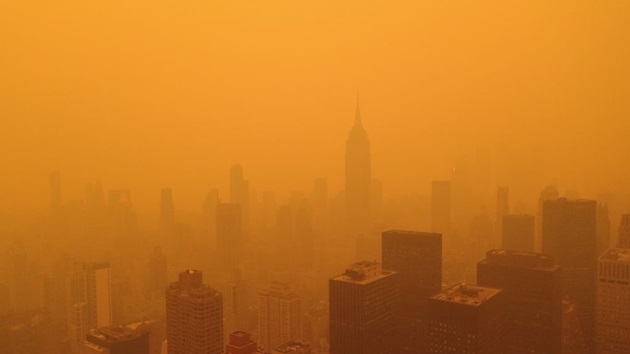(NEW YORK) — Wildfires are expected to worsen across the U.S. and by mid-century, the effects of wildfire smoke could bring startling health risks to 125 million Americans, a newly released study revealed.
For decades, the effects of wildfires were felt mainly on the West Coast, however, the dangerous rise of wildfires, and the toxic spread of smoke, is becoming a national crisis, and research from First Street Foundation shared Monday shows it’s escalating.
Wildfire smoke from the Canadian wildfires blanked parts of the Northeast and Midwest in June 2023 with a thick, orange haze. Eighteen states, from Montana to New York and as far south as Georgia, were under air quality alerts, according to AirNow at the time. New York City topped the list of the world’s worst air quality rankings by a landslide, according to IQ Air.
The Environmental Protection Agency’s Air Quality Index (AQI) categorizes the three most severe air quality levels as red being unhealthy, purple as very unhealthy and maroon as hazardous.
“A lot of people in the Midwest and the Northeast never really thought about the AQI,” Dr. Jeremy Porter, head of Climate Implications research for First Street Foundation, told ABC News. “All of a sudden, it’s on the news. Every day the weatherman is putting the AQI up at the beginning of the day, we became really familiar with an issue that people in the West have been dealing with for decades.”
First Street Foundation, a non-profit research and technology group that works to define America’s climate risk, shared its worrisome findings as well as an online tool that allows users to forecast the future of air quality for their specific locations across the US.
“There are already about 83 million people that are exposed to a ‘red day,’ or what we call an unhealthy air quality day. If you project the climate into the future 30 years, we’re expecting to see that grow to about 125 million people,” Porter said.
Despite great leaps forward in air pollution measures through the implementation of the Clean Air Act, the development of the EPA and the amendments to the Clean Air Act, the effects of wildfires are “wiping away 20 years of air quality improvements,” Porter said.
The foundation forecasted air quality in 2054 could revert to how bad it was in 2004.
“It’s a little bit disheartening to see that sort of shift, in this statistical trend,” Porter explained. “We’re now seeing air quality worsen over time with more pollution in the air.”
Wildfire smoke poses startling health risks to everyone, but especially individuals with existing health conditions. Wildfire smoke is associated with strokes, heart disease, respiratory disease, lung cancer and early death, according to the EPA.
With air quality reverting to levels before the Clean Air Act was enacted, Porter believes the pollution is “essentially adding back a quarter of a million premature deaths, we’re adding back 200,000 heart attacks, millions of additional hospital visits because of asthma.”
“It’s a concerning issue,” he said.
Professor Brian G. Henning, director of the Institute for Climate, Water and the Environment at Gonzaga University, reacted to the study’s findings, telling ABC News Monday, “It’s giving us more predictive capacity to be able to estimate how we might experience additional wildfire smoke.”
Henning believes preventative action should be taken on a federal level as wildfires are forecasted to affect the nation from coast to coast.
“There probably needs to be modifications to FEMA,” Henning said. “Right now a lot of our Federal Emergency Management funding goes into responding to disasters after they take place. We should add additional funding into programs — such as Building Resilient Infrastructure and Communities (BRIC) — so that we can prevent the harm before it happens.”
In terms of wildfire protection, Henning believes, “That whole idea of an ounce of prevention is better than a pound of cure is true.”
Copyright © 2024, ABC Audio. All rights reserved.












